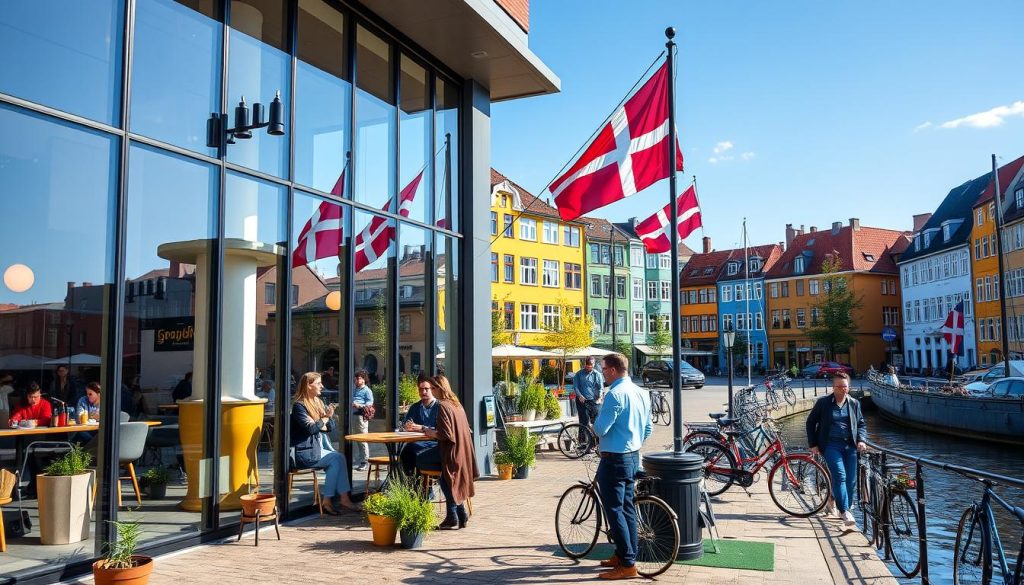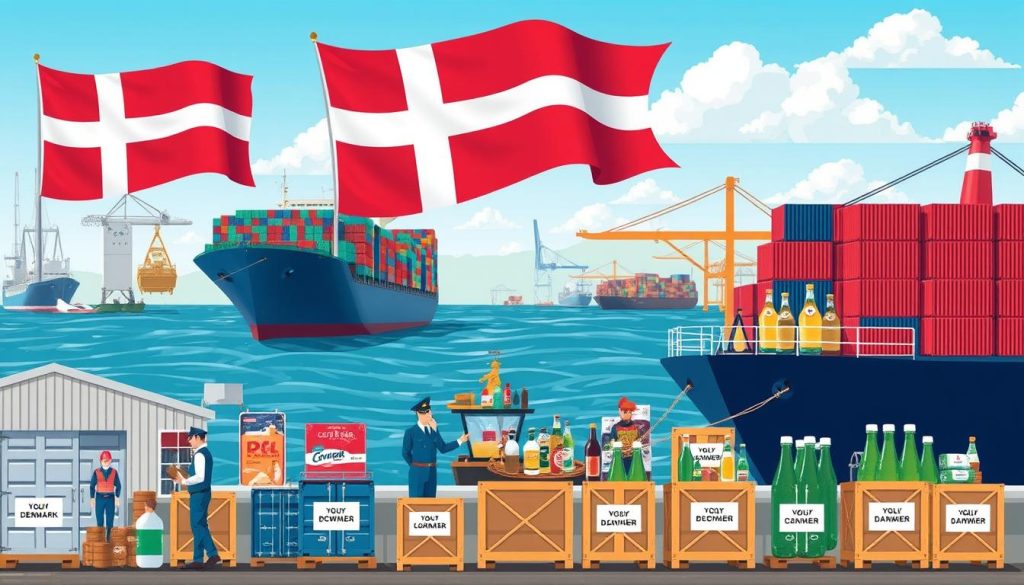Starting a business in Denmark is a thrilling chance for entrepreneurs. This guide will help you understand the Danish market, its culture, and legal rules. It’s perfect whether you’re new to business or have experience.
Understanding the Danish Market

The Danish market is full of chances for entrepreneurs wanting to make a mark in Northern Europe. It has a strong economy, making it a great place for investment and growing businesses. Knowing the current Market Trends is key for those looking to match their business with what people want and what’s happening in the industry.
Market Size and Trends
Denmark’s market is strong, thanks to many different sectors. The Danish Market Size has grown steadily, thanks to more money in people’s pockets and a desire for new products. Trends like digitalisation, going green, and health awareness are big in Denmark. This makes it a great place for businesses to grow, with many chances to reach new markets.
Key Industries in Denmark
Denmark has several key industries that offer business opportunities. These include:
- Renewable Energy: Denmark leads the world in wind energy, offering big investment chances.
- Information Technology: The IT sector is booming, with both new and established companies leading the way in digital change.
- Pharmaceuticals: With many big pharmaceutical companies, this industry is growing, offering chances for research and product development.
These industries are changing fast, showing that entrepreneurs can use Denmark’s strengths to help the economy grow.
Business Culture in Denmark

Getting to know Danish Business Culture is key for entrepreneurs aiming for success. Clear communication and a strong work ethic are at the heart of professional interactions. These values help create efficient and effective workplaces.
Communication Styles
In Denmark, communication is all about being direct and honest. People prefer straightforward talks without extra details. This is seen in business meetings, emails, and presentations.
Entrepreneurs should speak clearly, focusing on the main point. This ensures their message is understood. Key traits of Danish communication include:
- Transparency in sharing information
- Respect for differing opinions
- Informal yet professional tone
Grasping these points can greatly improve teamwork and negotiations. It leads to successful business partnerships.
Work Ethic and Expectations
The Work Ethic in Denmark is about balance, punctuality, and equality. People expect a structured work environment that respects their personal time. Key expectations include:
- Emphasis on teamwork and collaboration
- Valuing individual contributions while aiming for a common goal
- A focus on results, not just the hours worked
Knowing these aspects helps newcomers fit in better. It leads to a more productive and harmonious work environment. Understanding Danish Business Culture, including communication and work expectations, is vital for entrepreneurs seeking long-term success.
Legal Requirements for Entrepreneurs

For entrepreneurs starting in Denmark, knowing the law is key. This part covers important steps like registering your business, understanding tax laws, and following employment rules. These are crucial for running a business smoothly in the country.
Business Registration Process
The first thing to do is to register your business in Denmark. Here’s what you need to do:
- Choose a unique name for your business.
- Submit the needed documents to the Danish Business Authority.
- Get a CVR number for tax and legal purposes.
- Sign up for VAT if you need to.
Knowing these steps helps you follow Danish laws. This avoids legal problems later on.
Taxation Laws and Compliance
Danish tax laws have rules for businesses, like corporate tax rates and VAT. You should know about:
- The current corporate tax rate and how it affects profits.
- When and how to register for VAT.
- What taxes you must take from employee paychecks.
Staying up-to-date with these tax laws is important. It keeps your finances healthy and follows the rules.
Employment Regulations
Employment laws cover contracts, employee rights, and duties in Denmark. Important points include:
- Creating clear contracts that outline jobs and terms.
- Knowing employee rights on pay, hours, and leave.
- Following collective bargaining agreements if they apply.
Following these rules makes your workplace better. It also makes sure you’re following Danish laws.
Funding Opportunities for Startups

Entrepreneurs in Denmark can find many funding options to help their ideas grow. These include Government Grants and venture capital. Knowing about these can help startups get the financial support they need.
Government Grants and Subsidies
The Danish government has grants and subsidies to help new businesses. These funds aim to ease the financial load on startups. They support growth in different areas. Startups can find various Government Grants based on their needs and goals. Some key programmes are:
- Innovative Startups Grant
- Green Transition Grant
- Research and Development (R&D) Tax Credits
Venture Capital and Angel Investors
Denmark’s startup scene also benefits from venture capital firms and angel investors. They are key for startups looking to grow fast. Venture Capital Denmark offers funding, mentorship, and networking. Working with these investors can improve a startup’s business plan and strategy for success. When looking for venture capital and angel investors, consider:
- Knowing what investors look for.
- Having a strong business plan and pitch deck.
- Building a network with other entrepreneurs and investors.
Setting Up a Business in Denmark

Starting a business in Denmark means choosing a business structure and knowing the costs. You need to pick a structure that fits your goals and how you plan to work. There are many options, like being a sole trader, a partner, or a limited company. Each choice affects your legal, tax, and liability situation.
Choosing the Right Business Structure
When you’re Setting Up Business Denmark, picking the right structure is key. Here are some choices:
- Sole Proprietorship: Easy to start; you have full control.
- Partnership: You share ownership and duties with others.
- Limited Company: Protects your assets; you must follow certain rules.
Each option has its pros and cons. Think about what you need, like money and how complex your business will be.
Cost Considerations for Startups
Start-up costs are crucial when starting a business in Denmark. You need to plan your finances carefully. This includes:
- Money for equipment and stock.
- Legal fees for setting up and following rules.
- Day-to-day costs like rent, bills, and salaries.
- Money for marketing to get your business known.
Knowing these costs helps you make a budget. This makes starting your business smoother. Good financial planning is key to success in Denmark.
Doing Business in Denmark: Navigating the Regulatory Landscape

The Regulatory Landscape Denmark is key for entrepreneurs starting a business. It’s important to know the Business Regulations to follow national laws and industry rules. This knowledge helps avoid legal issues and keeps business running smoothly.
Several key areas make up the regulatory framework:
- Consumer Protection Laws: Businesses must follow rules to protect consumer rights, ensuring fairness and transparency.
- Data Protection Regulations: Following GDPR is crucial, affecting how businesses manage personal data.
- Environmental Standards: Regulations push for sustainable practices, encouraging companies to be eco-friendly.
- Employment Law: Knowing employee rights and duties is vital for compliance. This includes rules on wages, working hours, and safety.
Entrepreneurs should look for help on Compliance Denmark to deal with these complex rules. It’s wise to talk to legal experts who know the Danish market well. This ensures you meet the regulatory standards.
Networking and Building Relationships

Networking in Denmark is key for business success. Building strong Business Relationships opens up new opportunities and helps businesses grow. Trade associations are great resources for entrepreneurs wanting to make a mark in the Danish market.
Trade Associations and Business Networks
Many Trade Associations Denmark help connect entrepreneurs and businesses. They provide valuable resources like industry insights, networking events, and advocacy support. Joining these associations can connect you with a wide network of professionals and potential partners.
- The Danish Chamber of Commerce
- StartUp Denmark
- Industry-specific trade groups
Effective Networking Strategies
To get the most out of Networking in Denmark, use smart strategies for making and keeping connections. Start by going to industry events, workshops, and seminars that match your business interests. Build real relationships by listening well, sharing your experiences, and helping others when you can.
- Be proactive: Contact new people right away.
- Follow up: Keep the conversation going with emails or social media.
- Participate in discussions: Join online forums related to your field.
Marketing Strategies for the Danish Market

Marketing in Denmark needs a deep understanding of local habits and digital tools. Danish people have special tastes that businesses must know. This part talks about how to adjust marketing to fit these tastes and use digital platforms well.
Understanding Danish Consumer Behaviour
Danish consumers value honesty, sustainability, and quality. Knowing these values is key for businesses to grab Danish attention. Important points include:
- They like honest marketing messages
- They want sustainable products
- They prefer local brands
- Good customer service is very important
By making marketing fit these habits, businesses can build loyalty and trust in Denmark.
Utilising Digital Marketing Tools
Digital marketing in Denmark is vital for reaching people. Businesses should use these digital tools to make a big impact:
- Social Media: Use Facebook and Instagram to connect with Danes.
- Email Marketing: Send personalised emails that match Danish interests.
- SEO: Improve online presence with well-optimised content to attract more locals.
- Content Marketing: Share valuable content to show expertise and build trust.
Using these digital strategies boosts visibility and helps make real connections with people. This drives engagement and sales in Denmark.
Establishing a Local Presence

To succeed in Denmark, having a Local Presence Denmark is key. Entrepreneurs need to pick the right Business Location Denmark. This choice affects operations and market access a lot.
Being close to clients, suppliers, and rivals is important. It shapes the decision on where to set up.
Choosing the Right Location
When picking a Business Location Denmark, consider a few things:
- How easy it is to get around
- If there’s skilled labour nearby
- The quality of local infrastructure and facilities
- How close it is to your target market
A good location boosts efficiency and visibility. It helps businesses reach out to customers more easily.
Leveraging Local Expertise
Working with Local Experts Denmark is very helpful when entering the market. They know the Danish business scene well. They understand laws, consumer habits, and culture.
Partnering with local consultants and agencies can help a lot. It leads to:
- Better planning
- Local networks and contacts
- Custom marketing plans
- Knowledge of industry trends
Using local expertise makes setting up in Denmark smoother. It also increases chances of success in the long run.
Cultural Sensitivity in Business

Knowing about cultural sensitivity in Denmark is key for business success. Understanding Danish values helps in making good connections in Denmark’s business world. Trust, equality, and openness are at the heart of Danish society. They help create a friendly atmosphere among colleagues and clients.
Understanding Danish Values
Danish values focus on being open and working together. Businesses do well when everyone respects each other. It’s also important to value work-life balance, showing Denmark’s care for employee wellbeing.
Adapting Your Approach
To succeed in Denmark, entrepreneurs need to adjust their ways. They should support equal opportunities and create welcoming spaces. By listening well and valuing everyone’s ideas, they show respect for different views. This supports Danish values.
Challenges of Doing Business in Denmark

Starting a business in Denmark comes with its own set of challenges. It’s important to know these challenges to succeed. High operational costs and constant market changes are just a few of them.
Common Pitfalls to Avoid
Entrepreneurs should watch out for several common pitfalls in Denmark. These include:
- Underestimating the importance of local market research, which can lead to misinformed decisions.
- Neglecting to build relationships within the business community, which is vital in Danish culture.
- Failing to comply with local regulations, resulting in potential legal issues.
- Ignoring the nuances of Danish consumer preferences, which can impact marketing strategies.
Adapting to a Competitive Landscape
The Danish market is highly competitive. Businesses need to be innovative and agile. They must develop unique value propositions to stand out. Here are some key factors to consider:
- Conducting thorough competitor analysis to identify strengths and weaknesses.
- Investing in marketing strategies that resonate with the local audience.
- Adopting sustainable practices that appeal to eco-conscious consumers.
- Being flexible in approach to adjust to shifting market demands quickly.
Succession Planning and Scaling Up

In Denmark, effective succession planning is key for long-term success. Business Scaling needs a strategic approach to make the most of Denmark’s growth opportunities. By focusing on long-term strategies, entrepreneurs can prepare their businesses for the future. They also navigate the Danish market’s complexities.
Long-term Business Strategies
A good succession plan maps out a business’s future leadership. Entrepreneurs should think about these key points:
- Identifying potential successors from within the organisation or hiring externally.
- Setting up training programmes for future leaders.
- Planning finances for a smooth transition.
- Keeping stakeholders informed to build trust.
Identifying Growth Opportunities
Spotting and using Denmark’s growth opportunities is crucial for scaling. Entrepreneurs can grow by:
- Doing deep market research to find new trends and needs.
- Looking for new partnerships to improve products.
- Investing in new tech for better efficiency.
- Staying ahead of market changes to stay competitive.
Import and Export Regulations

It’s vital for businesses to know the import and export rules in Denmark. These rules help follow national laws and EU guidelines. This makes trade smoother. Companies must follow specific rules to import goods into Denmark.
Customs Procedures in Denmark
Businesses need to understand customs rules. Key steps include:
- Getting ready the right documents, like customs declarations and invoices.
- Knowing about tariffs and trade restrictions.
- Understanding import duties and taxes for certain goods.
Export rules in Denmark are also crucial. They ensure products are safe and meet quality standards before export. Following these rules helps avoid delays and fines.
Benefits of EU Membership
Being in the European Union helps Danish businesses a lot. EU Membership Benefits include:
- Lower tariffs for better prices.
- Easy customs procedures for smoother trade.
- Access to a big market without lots of paperwork.
These benefits help Danish companies grow globally. They take advantage of good trade conditions.
Sustainability Practices in Danish Business

Denmark leads in sustainability, with a business culture focused on ethics. It’s key for entrepreneurs to understand Corporate Social Responsibility Denmark. By adopting sustainable practices, businesses boost their reputation and gain a competitive edge in an eco-aware world.
Importance of Corporate Social Responsibility
In Denmark, Corporate Social Responsibility is vital for businesses. Consumers and stakeholders value companies that care about social and environmental issues. By embracing CSR, firms show they’re committed to positive change. This builds trust and loyalty with customers and promotes a culture of integrity at work.
Implementing Green Business Strategies
Green Business Strategies are crucial for companies aiming to support Sustainability Denmark. Effective strategies include:
- Reducing waste through recycling and efficient resource use.
- Using renewable energy like wind and solar power.
- Ensuring sustainable supply chains, with all partners sharing eco-friendly goals.
Successful CSR initiatives in Denmark show that sustainability commitment can lead to real benefits. It drives growth and improves brand image.
Utilising Technology in Your Business

In Denmark, business is changing fast thanks to new technology. Entrepreneurs need to use technology in Denmark to work better and be more creative. The country is all about innovation Denmark, making it great for tech startups.
Innovation in the Danish Market
The Danish market is full of chances for new ideas. Companies want to use the latest tech to stay ahead. They focus on research and development, leading to new and successful ideas.
Choosing the Right Tech Solutions
Choosing the right tech is key for any tech solutions business in Denmark. Entrepreneurs should think about a few things:
- What your business really needs
- If the tech can grow with your business
- If it works well with what you already have
- Looking for easy-to-use tech that helps teams work together
- Thinking about the cost and if it will pay off
Success Stories of Entrepreneurs in Denmark

Denmark is known for its thriving entrepreneurial spirit. It has many success stories that motivate both new and seasoned business owners. We look at how local businesses in Denmark have innovated and what they’ve learned along the way. Their stories teach us about effective strategies and the grit needed to succeed.
Lessons Learned from Local Businesses
Successful local businesses in Denmark share important lessons. Here are some key points:
- It’s crucial to know what the market needs and how people behave.
- Creating a strong brand that connects with your audience is vital.
- Building a wide network helps with growth and teamwork.
- Using technology can make operations smoother and improve customer interaction.
Inspirational Case Studies
Real-life examples show the journeys of successful entrepreneurs. Here are some notable ones:
- Too Good To Go: This app links people with extra food from local places, turning waste into something valuable.
- Valantic: This company mixes digital marketing and tech to boost brands online, showing the power of innovation.
- Just Eat: Starting in Denmark, this online food ordering service shows how focusing on a specific area can lead to big success.
Resources and Support for Entrepreneurs
Denmark has a lot to offer entrepreneurs. It has many government programs to help with money, advice, and a place to grow. The Danish Business Authority is key, with funding, rules, and startup support.
There are also non-profit groups to help new businesses. The Danish Entrepreneurship Association, for example, runs workshops and events. These help entrepreneurs learn and meet experts, making it easier to start a business in Denmark.
The Danish business community is also very helpful. Joining local networks can lead to partnerships and valuable advice. With these resources, entrepreneurs in Denmark can do well and help the country’s business scene thrive.

